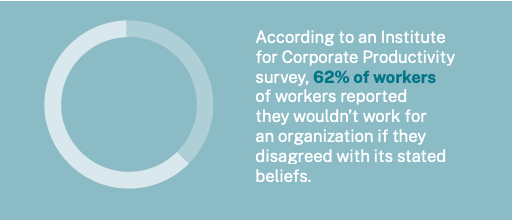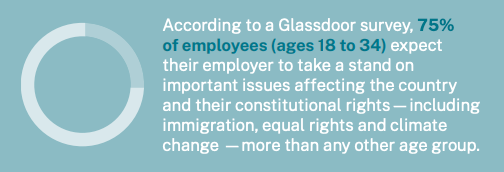
All organizations impact society in a variety of ways. This influence could be through their core products or services, how they conduct business or even a combination of both. Corporate social responsibility (CSR) generally refers to an organization’s impact and how it approaches accountability for its actions. CSR compasses internal and external business activities, but notably, it can have a crucial impact on attracting and retaining employees—which are top challenges for employers today.
Generally, CSR topics fall under the following categories:
- Environmental—Often used interchangeably with sustainability, environmental CSR refers to how an organization’s actions impact the environment. Environmental and sustainability efforts are often at the core of a CSR strategy, as organizations strive to make decisions that balance both short- and long-term goals.
- Social—Social CSR can include working conditions, inclusion efforts and labor practices.
- Economic—Economic CSR refers to efforts that financially impact an organization and society concurrently, such as job creation, profit sharing with stakeholders and more.
Some organizations formally report their CSR initiatives. While formal reporting isn’t necessary for every employer, it can be used to establish accountability and quantify the impactful work your organization is doing to benefit society.

Why It Matters
Employees seek to be part of a greater cause. Many of today’s workers want to work for organizations that share the same as themselves. This alignment can help employers hire and keep more talent—especially in today’s competitive labor market. When workers feel that their employer is socially responsible, they experience a greater sense of identity with their organization.
Notably, younger generations (e.g., millennials and Generation Z) disproportionally care about CSR and hope to be part of an organization that shares its values. Estimates show that by 2030, Generation Z (those born between 1995 and 2010) could make up over half the workforce. Generation Z does not purely create opinions about companies due to product or service quality and is genuinely interested in business ethics, practices and social impact.

Similarly, Tallo found that 68% of Gen Z feel it’s important for an employer to support a cause that they are passionate about. Minimizing the negative impact on the environment and combating climate change topped the list of reasons the age group wants companies to take seriously. As such, an effective CSR strategy can positively aid a company’s recruiting efforts and attract workers’ who share the same values and goals as the organization.
CSR can aid in talent strategies, but it can also positively impact organizational relationships with customers, clients, suppliers and other stakeholders. An employer’s reputation among employees can also relate to an employer’s external branding and how stakeholders perceive an organization.
Employer Takeaway
Job seekers, consumers and investors are keeping an eye on how organizations treat their employees and communities. Employees want to be part of a more significant cause, and authentic CSR initiatives can resonate with current and prospective employees and other stakeholders. CSR may be a new concept to some employers or could already be part of workplace discussions. Regardless, employers looking to stay competitive for business and talent can consider how CSR could play a role in HR and other organizational policies.
© Zywave, Inc. All rights reserved.
